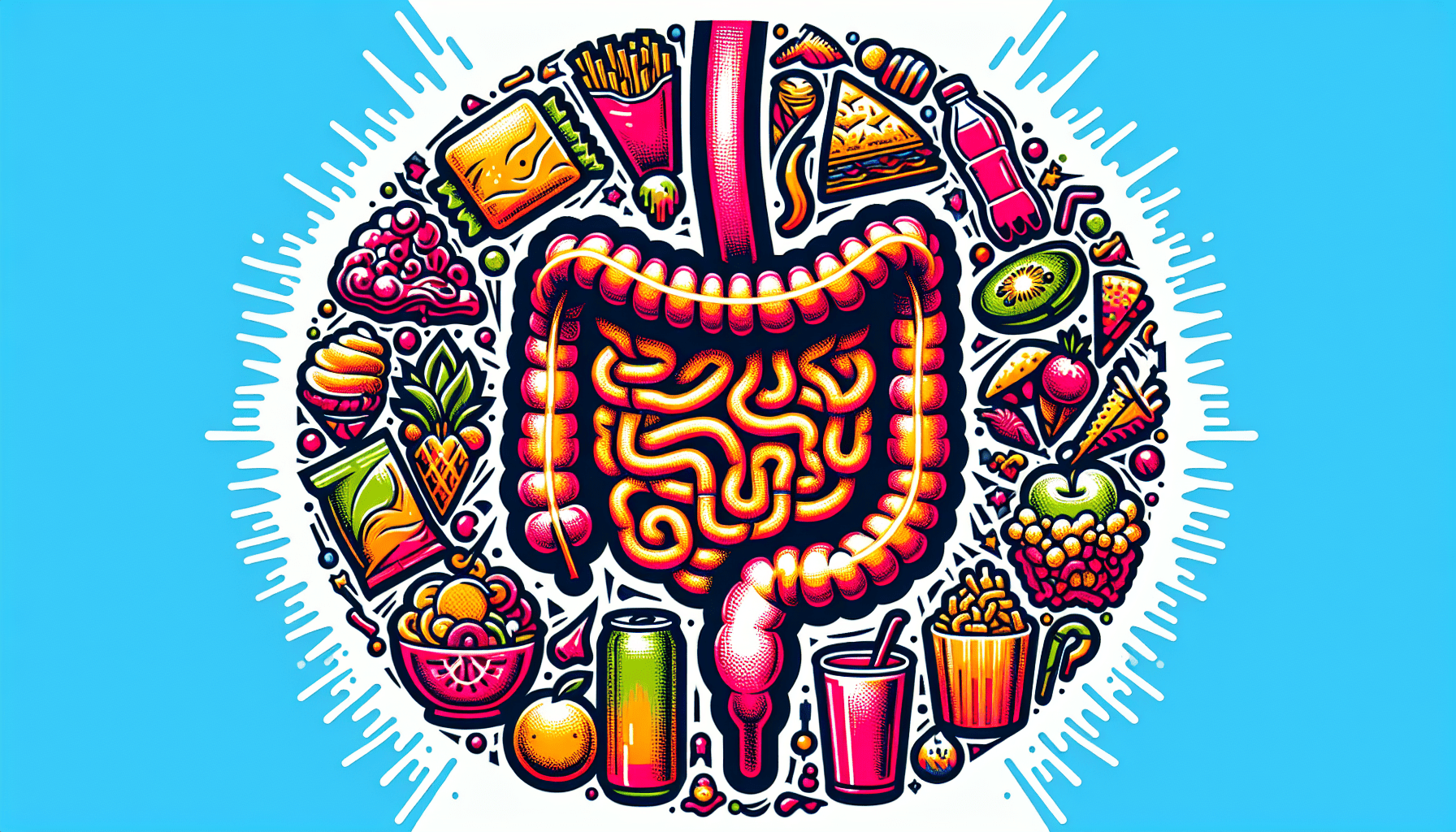Have you ever wondered about the impact your dietary choices have on your gut health? While many people tend to focus on counting calories or limiting carbs, paying attention to how certain foods affect your digestive system is equally crucial. The health of your gut is pivotal not only for digestion but also for your overall well-being. In this piece, we will explore foods that can wreak havoc on your gut and explain why you might want to limit or avoid them for optimal health.

Understanding Gut Health
Gut health refers to the balance of microorganisms living in your digestive tract. These microorganisms, including bacteria, fungi, and viruses, play a vital role in digestion, nutrient absorption, and even the functioning of your immune system. Maintaining a healthy gut is essential for overall health and well-being.
The Gut Microbiome
The gut microbiome consists of trillions of microorganisms. A balanced microbiome supports the body’s natural functions, but an imbalance, known as dysbiosis, can lead to several health issues. From gastrointestinal conditions to affecting mental health due to the gut-brain connection, maintaining a healthy microbiome is crucial.
Importance of a Healthy Gut
A healthy gut is linked to numerous health benefits, including improved digestion, enhanced immune function, and even better mental health. Issues like bloating, constipation, and indigestion might be signs that your gut health needs attention. Let’s examine the foods known to have negative impacts on your gut health.
Foods That Can Harm Your Gut
Several foods are notorious for causing harm to the gut. While these might be part of your regular diet, understanding their effects can help you make informed decisions about their consumption.
Processed Foods
Processed foods often contain additives and preservatives that can disrupt your gut health. These ingredients are not only hard to digest but can also alter your gut microbiome’s balance, contributing to inflammation and other digestive issues.
- Artificial preservatives: These chemicals help in prolonging shelf life but can upset the natural balance of your gut flora.
- Emulsifiers and thickeners: Common in packaged foods, they can irritate the gut lining.
- Refined sugars: Often present in high quantities, they can stimulate the growth of harmful bacteria.
Sugary Foods and Beverages
Excessive sugar intake is linked to various health problems, and your gut is no exception. High sugar diets can feed harmful bacteria and yeast in your gut, leading to an imbalance that affects your digestive health.
- Soft drinks and sodas: These are often packed with sugar and can alter the gut microbiota significantly.
- Candies and sweet treats: The sugars feed harmful bacteria, leading to their overgrowth.
Fried Foods
Fried foods are heavy, difficult to digest, and often come with unhealthy fats. These fats can remain in the digestive tract for long periods, encouraging the growth of harmful bacteria and causing gut inflammation.
Dairy Products
Many people have lactose intolerance or sensitivity to dairy, which can lead to digestive distress. Even those without lactose intolerance might experience discomfort if dairy products upset their gut balance.
- High-fat dairy: Butter and cheese can be harder to digest and might increase inflammation in the gut.
Gluten-Containing Foods
For some, especially those with celiac disease or gluten intolerance, gluten can cause significant digestive issues. It can damage the intestinal lining, leading to malnutrition and other gut-related issues.
- Wheat products: Such as bread and pasta may cause irritation for some people’s digestive systems.
- Barley and rye: Often overlooked grains that also contain gluten.
Foods High in Additives
Additives like artificial coloring, flavors, and sweeteners can negatively impact gut health. Many additives are synthetic and are not easily processed by the gut, leading to potential inflammation and imbalance.
Alcoholic Beverages
Alcohol, particularly when consumed in excess, can severely affect gut health. It can alter the composition of the gut microbiota and increase gut permeability (also known as leaky gut), which allows toxins and bacteria to pass into the bloodstream.

Understanding the Culprits Through a Table
The table below gives you a brief overview of common foods that may damage your gut and their potential effects:
| Food Category | Common Examples | Potential Effects on Gut Health |
|---|---|---|
| Processed Foods | Packaged snacks, baked goods | Alters gut microbiota, increases inflammation |
| Sugary Foods | Candy, sodas | Feeds harmful bacteria, leads to imbalance |
| Fried Foods | Fries, fried chicken | Encourages growth of harmful bacteria |
| Dairy Products | Cheese, milk | Causes irritation for lactose-intolerant persons |
| Gluten-Containing Foods | Bread, pasta | Damages intestinal lining in sensitive individuals |
| Additives | Artificial colors, sweeteners | Increases gut inflammation and imbalance |
| Alcoholic Beverages | Beer, wine, spirits | Alters gut microbiota, increases permeability |
How to Restore and Maintain Gut Health
Understanding which foods to avoid is only half the battle. Equally important is knowing how to promote gut health through diet and lifestyle changes.
Incorporating Probiotics
Probiotics are live microorganisms that can help restore gut flora balance. You can incorporate them through supplements or by eating foods rich in these beneficial bacteria.
- Yogurt: A great natural source of probiotics, look for labels that mention live and active cultures.
- Kefir and fermented foods: Such as sauerkraut or kimchi, these foods are packed with gut-friendly bacteria.
Embracing Prebiotics
Prebiotics are non-digestible fibers that feed beneficial bacteria in your gut. Eating a variety of prebiotic-rich foods can help healthy gut flora thrive.
- Onions and garlic: Rich in natural prebiotics.
- Bananas and asparagus: Easy ways to integrate prebiotics into your daily diet.
Consuming Whole Foods
Whole foods, particularly fruits, vegetables, whole grains, and lean proteins, contribute to overall gut health. These foods provide fiber and essential nutrients that promote digestive health.
- Fruits and vegetables: Provide necessary vitamins and minerals.
- Whole grains: Such as oats and brown rice, support bowel regularity.
Staying Hydrated
Adequate hydration is essential for digestion. Drinking plenty of water aids in nutrient absorption and facilitates the passage of waste, keeping your digestive tract functioning smoothly.
Practicing Mindful Eating
How you eat is as important as what you eat. By slowing down and paying attention to your meals, you allow your digestive system to process food more efficiently.
- Chew your food properly: It helps the digestion process start in the mouth.
- Listen to your body’s signals: Recognize when you’re hungry or full.

Lifestyle Tips for Gut Health
Beyond diet, lifestyle choices also play a significant role in gut health. Incorporating some healthy practices can significantly enhance your gut’s functioning and well-being.
Regular Exercise
Physical activity stimulates the muscles in your digestive tract and can improve gut health. Regular exercise can enhance your metabolism and support overall digestive processes.
Stress Management
Chronic stress can negatively impact gut health. Finding ways to manage stress can help keep your gut in check.
- Practice yoga or meditation: Techniques that help in relaxation and stress reduction.
- Engage in hobbies you enjoy: This can distract your mind and reduce stress levels.
Sufficient Sleep
Quality sleep is essential for the repair and restoration of body systems, including the gut. Aim for 7-9 hours of sleep per night to promote overall health.
Conclusion
Your gut health is integral to your overall well-being, and the food choices you make daily can significantly impact it. By understanding the foods that commonly harm gut health and taking active steps to adjust your diet and lifestyle, you can promote a healthier gut environment. Remember, listening to your body and responding to its needs is vital in maintaining balance and health in your life.
